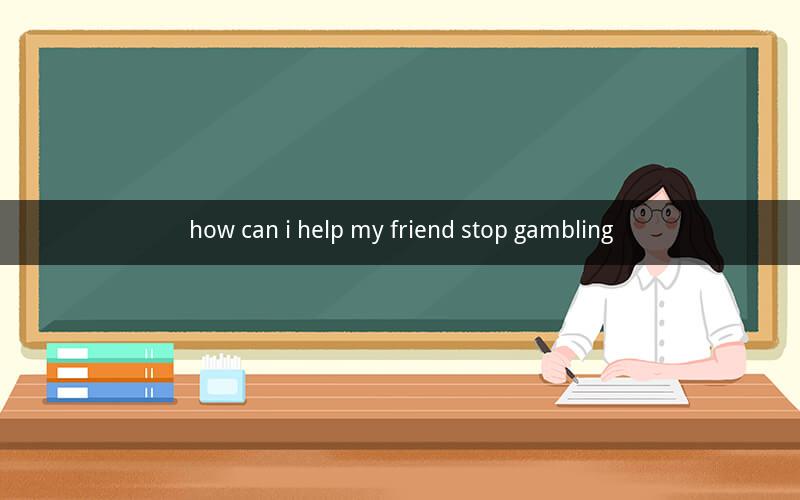
How Can I Help My Friend Stop Gambling?
Table of Contents
1. Understanding the Problem
2. Communicating with Your Friend
3. Encouraging Professional Help
4. Supporting Them Through Withdrawal
5. Creating a Supportive Environment
6. Setting Boundaries
7. Educating Yourself About Gambling
8. Encouraging Healthy Alternatives
9. Monitoring Progress
10. Maintaining Long-Term Support
1. Understanding the Problem
To help your friend stop gambling, it is crucial to first understand the nature of the problem. Gambling addiction is a complex issue that often involves psychological, emotional, and financial consequences. Recognize that gambling addiction is a disease and that your friend may need support and understanding to overcome it.
2. Communicating with Your Friend
Open and honest communication is key. Find a suitable time and place to talk with your friend about their gambling habits. Express your concerns without judgment or anger. Use "I" statements to convey your feelings, such as "I'm worried about you" or "I care about your well-being."
3. Encouraging Professional Help
Suggest that your friend seek professional help from a therapist or counselor specializing in gambling addiction. A professional can provide personalized strategies and support tailored to your friend's needs.
4. Supporting Them Through Withdrawal
Gambling addiction can lead to withdrawal symptoms, such as irritability, anxiety, and depression. Encourage your friend to stay connected with their support network during this challenging time. Offer to accompany them to therapy sessions or support group meetings.
5. Creating a Supportive Environment
Help your friend create a supportive environment that minimizes the temptation to gamble. This may involve removing access to gambling websites, limiting exposure to gambling-related advertisements, or even changing social circles if necessary.
6. Setting Boundaries
Establish clear boundaries to protect your friend from the temptation to gamble. This may include limiting the amount of money they have access to or asking them to avoid certain social situations that may trigger their gambling behavior.
7. Educating Yourself About Gambling
Familiarize yourself with the signs of gambling addiction, the psychological effects of gambling, and the available resources for support. This knowledge will help you better understand your friend's situation and offer appropriate assistance.
8. Encouraging Healthy Alternatives
Encourage your friend to engage in healthy activities that can replace the time and money spent on gambling. This may include sports, hobbies, or joining a support group. The goal is to find fulfilling activities that promote well-being and reduce the urge to gamble.
9. Monitoring Progress
Keep an eye on your friend's progress and offer ongoing support. Celebrate small victories and acknowledge their efforts to overcome the addiction. Encourage them to keep a journal of their progress and share it with you or their therapist.
10. Maintaining Long-Term Support
Support your friend for the long term, as recovery from gambling addiction is a gradual process. Continue to be there for them during challenging times and remind them of their strengths and achievements.
Frequently Asked Questions
Q1: How can I tell if my friend's gambling is a problem?
A1: Look for signs such as secretive behavior, financial difficulties, neglect of responsibilities, and changes in mood or appearance.
Q2: Should I confront my friend about their gambling?
A2: Yes, but approach the conversation with empathy and care. Use "I" statements to express your concerns without placing blame.
Q3: Can I force my friend to seek help?
A3: No, but you can encourage and support them in seeking help. Remember that the decision to seek treatment must come from your friend.
Q4: What if my friend is unwilling to stop gambling?
A4: Continue to offer support and encouragement. Consider involving a professional who can provide guidance and strategies to help your friend overcome their addiction.
Q5: How can I help my friend stay motivated during recovery?
A5: Celebrate small victories, offer positive reinforcement, and encourage them to maintain a support network of friends and family.
Q6: Is there a support group for friends and family of gamblers?
A6: Yes, there are various support groups available, such as Gam-Anon, where you can find support and resources for dealing with a loved one's gambling addiction.
Q7: Can I help my friend by taking over their financial responsibilities?
A7: While it may seem helpful in the short term, it is important to encourage your friend to take responsibility for their financial situation. Offer guidance and support, but avoid enabling their addiction.
Q8: How can I help my friend avoid relapse?
A8: Encourage them to maintain a structured routine, stay connected with their support network, and avoid triggers that may lead to gambling.
Q9: What should I do if my friend's gambling causes legal issues?
A9: Encourage them to seek legal advice and support. Offer to accompany them to meetings with lawyers or court appearances, if necessary.
Q10: How can I cope with the stress of helping my friend overcome their gambling addiction?
A10: Seek support for yourself by joining a support group or speaking with a counselor. Take care of your own mental and emotional well-being to better support your friend.